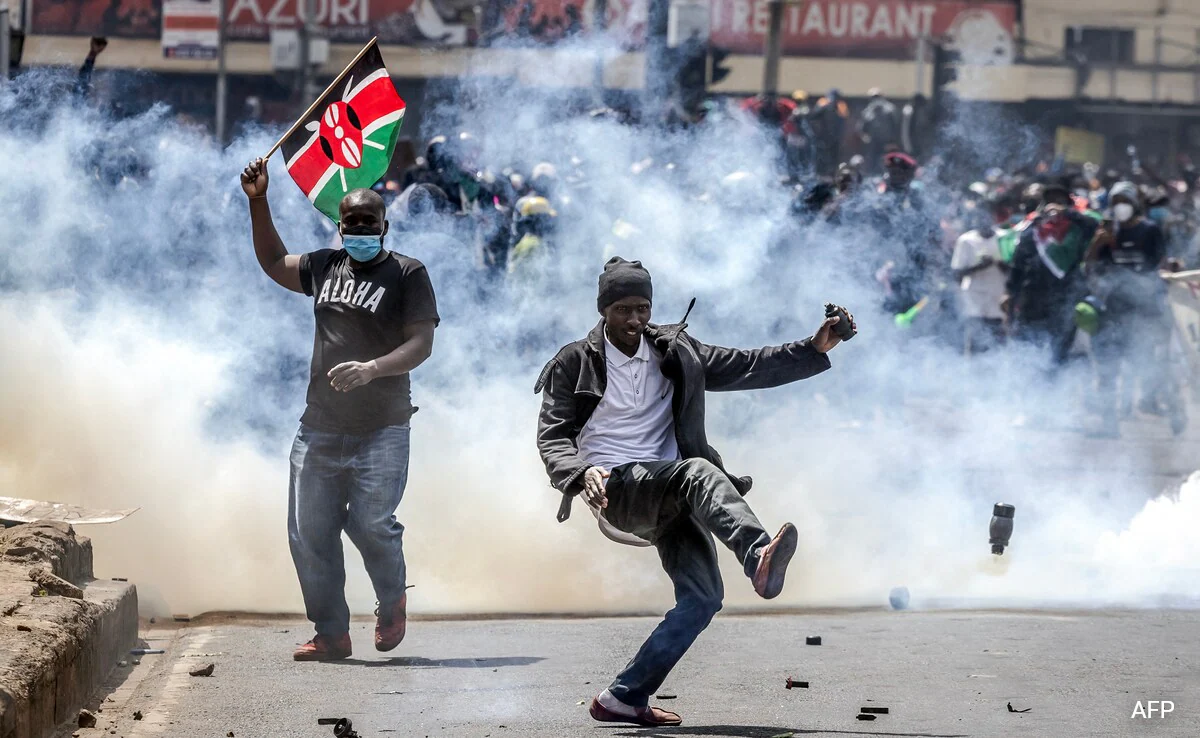Kenyan youth unite beyond party lines to demand a voice in shaping their nation’s future. Can young Ethiopians learn from this and do the same?

In 2019, a photograph of Alaa Salah, a young student and activist, graced the front pages of newspapers worldwide. Draped in a traditional Sudanese white dress and standing atop a car, her finger pointed skyward in a gesture of defiance against Sudan’s autocratic ruler, Omar al-Bashir. Salah became an emblem of the Sudanese revolution, epitomizing the courage and resilience of African youth and women. Fast forward five years, and similar images of defiant African youth are emerging from Kenya, where young men and women are rallying against an unpopular finance bill. On June 25, 2024, Kenyan police opened fire on protesters, killing at least five people when some demonstrators attempted to storm the country’s parliament.

Lana Haroun April 8-2019
The protest was sparked by a controversial bill proposing tax hikes across various sectors, perceived as unfairly burdensome on the youth. The bill, now passed, awaits the president’s signature to become law. Kenya, grappling with substantial debt, sees these tax increases as a solution, despite warnings from experts. Some economists cautioned that such a revenue-focused fiscal consolidation deal with the IMF would inevitably provoke public outrage.
Indeed, Kenyans, led by Generation Z, have taken to the streets, viewing the bill as punitive and detrimental to their livelihoods. In a bid to quell the protests, the Kenyan government, under President William Ruto, has made concessions, scrapping levies on cooking oil, mobile money services, and motor vehicles, and modifying a proposed eco-tax on imported goods. Yet, these protests signify deeper issues. Soaring unemployment rates and a stalled economy leave young Kenyans feeling disillusioned.
Despite having college degrees, many graduates are forced to resort to desperate measures, such as wearing signs around their necks, in search of employment. The scale of the protests reflects widespread frustration with economic policies seen as disproportionately affecting the youth. However, it also signals a unique opportunity for transformation. Kenya’s Gen Z has set a new standard for activism, organizing peaceful protests and leveraging social media to coordinate and mobilize. These leaderless, non-hierarchical protests are more resilient against political manipulation.

Kenyan political commentator, journalist, and contributor to the East African Review, Chris Sambu, observes that the protests transcend party and tribal loyalties, marking a significant shift from past movements. This new wave of activism has encountered resistance from the political elite, unaccustomed to such organized dissent. The peaceful nature of these demonstrations, despite the violent crackdown by the police, underscores the determination of Kenyan youth. Activists, human rights groups, and even former President Uhuru Kenyatta have condemned the police brutality.
The grieving mother of one of the victims poignantly questioned the use of lethal force against those fighting for their rights. Social media has played a crucial role in these protests, with platforms like Twitter and TikTok amplifying messages and organizing efforts. Hashtags such as #RejectFinanceBill and #OccupyParliament have garnered widespread support, illustrating the power of digital activism. Historically, youth have been at the forefront of revolutions, from the student-led protests in Tiananmen Square to the Arab Spring uprisings.
In the United States, the Civil Rights Movement and the anti-apartheid movement in South Africa were driven by young activists. Contemporary youth-led protests, whether against Israel’s actions in Gaza or for constitutional limits in Senegal, continue to demonstrate the power of collective action. The courage and resilience of young people, their ability to unite and demand change, are the most potent tools for confronting and dismantling oppressive systems.
The Kenyan protests are a testament to this enduring spirit. As they face immense challenges, the youth of Kenya and Africa at large remain a beacon of hope, embodying the unyielding determination to create a better future. The world must take notice and support their quest for justice and equity. What is happening in Kenya—a youth-led and youth-organized protest—should serve as a lesson to Ethiopian youth for several reasons.
Firstly, the issues Kenyan youth are protesting against mirror the challenges faced by Ethiopian youth: a dysfunctional and broken system, soaring unemployment, indifferent oligarchs, and a crisis in the cost of living. However, what sets Kenyan youth apart from their Ethiopian counterparts is their decision to set aside differences, reject the false promises of political oligarchs, and unite for the greater good of their generation and future generations.

This is where Ethiopian youth could learn from their counterparts. By putting aside internal divisions and uniting for a common cause, the country’s young people represent its only hope. Failing to embrace these ideals or ignoring the developments in the region would be akin to consigning the country to perpetual stagnation. Kenyan youth have shown the continent the way; it is now up to African youth, including Ethiopian youth, to rise and demand change.
Adding to the urgency, last month Amnesty International reported that the Ethiopian authorities have used the state of emergency to silence peaceful dissent by arbitrarily detaining prominent politicians critical of the government and journalists. On 2 February 2024, Ethiopia’s House of People’s Representatives endorsed an extension of the state of emergency, which came into force in August 2023 amid escalating war in the Amhara region between government forces and Fano freedom fighters. The nationwide state of emergency has given authorities sweeping powers to arrest suspects without a court warrant, impose curfews, restrict the right to freedom of movement, and ban public assemblies or associations.
Compounding these challenges, last December, Ethiopia became the third African country to formally default on its debt in as many years, after missing the deadline to make a $33 million interest payment on its only international bond. This default places the East African country among a growing number of emerging economies that have defaulted on their debt in the aftermath of the pandemic. According to the World Bank, there have been 18 sovereign defaults in 10 developing countries in the past three years, a number greater than that recorded in all of the previous two decades.
In light of these economic and political crises, the example set by Kenyan youth is even more pertinent. By uniting for the greater good, Ethiopian youth have the potential to drive meaningful change and secure a better future for themselves and future generations.




